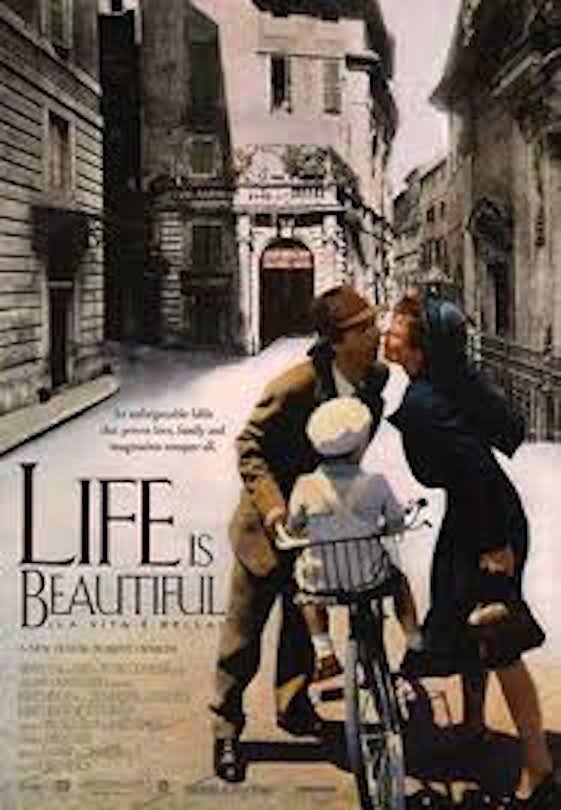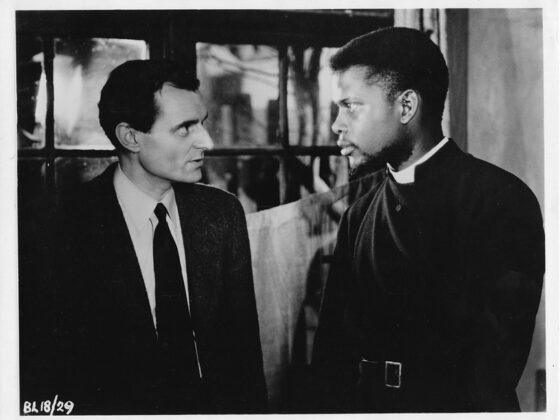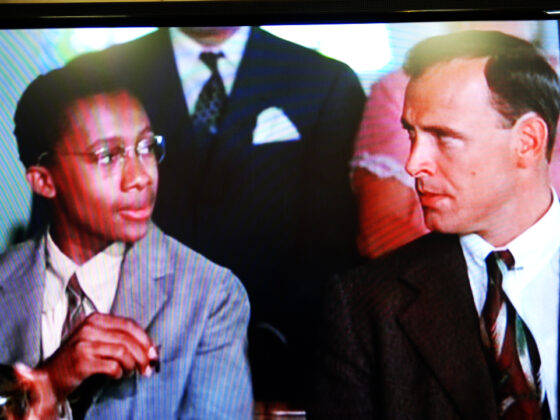Available: DVD, Amazon Prime, Hulu Premium
Language: Italian. English dubbing and various subtitles
Characters: Guido (Roberto Benigni, who is also the Director)
Dora, his wife (Nicoletta Braschi, Benigni’s real-life wife)
Joshua, his son (Giorgio Cantarini)
There is a fine line between comedy and tragedy, as signified in the two-faced Janus mask. Because life is filled with sorrows as well as joys, drama which is true to life will have both tragic and comic elements, but it is only in the Christian narrative that comedy prevails. In the prologue to his Gospel, St. John affirms: “The light shines in the darkness and the darkness has not overcome it.”
Life is Beautiful is, I think, the most profound – and, yes, beautiful – enactment of this truth in the film repertoire.
Life is Beautiful has two acts. In the first act, the hero Guido, a happy-go-lucky young man, charms a lovely lady named Dora into marrying him. They have a little boy named Joshua. But Guido has a problem, foreshadowed in the first act and dominating the second: he is a Jew living in Italy as the fascists and Nazis take over. Then in 1944, he and his son are sent to a death camp, and Dora voluntarily follows them.
In the first act, Guido repeatedly mocks the pompous fascist bureaucrats who are sold out to the current ideology in scenes of Chaplinesque humor. In one scene he poses as a government inspector of a school who is asked to lecture on the superiority of the Aryan race. Beginning with the ear lobe and ending with the belly button, Guido displays his own wiry Jewish body as a marvel of Aryan science.
The mocking of the first half continues in the second. In this film, there is no Schindler to protect this family, only Guido himself. He does this by orchestrating a counter-narrative. He convinces his son to believe that their imprisonment is in reality a competition to win a prize, a tank, not a toy tank but a real tank. In what must be one of the greatest comic scenes of all time, Guido volunteers to translate for the camp commander (Guido does not know German). As the German barks out the deadly rules, Guido transforms them into the rules of his game – getting to 1,000 points to win the tank. Joshua is amazed. At the same time, Guido finds ingenious ways to send messages to his wife in the women’s section assuring her that he and Joshua are alive and looking forward to seeing her again.
This brings me to what I consider the divine meaning of this comedy. Guido, I think, is a Christ figure.
At the beginning of the movie, Guido approaches a young girl in a barnyard and explains that he is the Prince who owns all the land round about. At that very moment, a lady (Dora) falls out of the hayloft and lands on top of him. “Buon giono, Principessa!” he exclaims. She looks at him in utter amazement. This is the first of several miracles by which he woos her, and each time she is amazed. It is in this amazement, I think, that Guido demonstrates his princely power over the sons of darkness on behalf of the children of light.
Not only is Guido a Christ figure but Dora is a type of the Virgin Mary. In the climactic scene of their courtship, Dora speaks of the key to her heart, and Guido cries out, “Mary, throw down the key!” and a key falls at her feet (you’ll have to see the movie to figure out how). Guido’s love for his Princess and her son is the moving power of the entire story.
That love comes to a climax as the Germans are hurrying to abandon the camp as the Allies approach. In the midst of the confusion, Guido takes action at the risk of his life. He hides Joshua in a cabinet in the courtyard and makes him swear to stay there until all is quiet. He then rushes out to find Dora among the female prisoners. He can’t find her, and in the process he is captured by the Nazis. As he is led by a stormtrooper past Joshua’s hiding place, he winks at his son and mock goose-steps into the darkness, where we hear a ratta-tat-tat.
I will not divulge what happens to Joshua next but only say that at the end of the film he is reunited with his mother. “Mama, we won!” he exclaims. “Yes, we won!” she replies. Death is swallowed up in victory. I have a pretty high tear threshold, but this scene breaks through it every time. I can’t help but think of St. Paul’s description of the mystery of Christ and the Church:
Husbands, love your wives, as Christ loved the church and gave himself up for her, that he might sanctify her, having cleansed her by the washing of water with the word, so that he might present the church to himself in splendor, without spot or wrinkle or any such thing, that she might be holy and without blemish. (Ephesians 5:25-27)
And I might add that Christ’s love is for His chosen people, the Jews. As St. Paul says: “Brothers, my heart’s desire and prayer to God for them is that they may be saved” (Romans 10:1). Roberto Benigni, the movie’s script-writer, director, and principal actor, took an enormous risk in portraying the Holocaust as a comedy, a risk that has been rewarded with universal acclaim by the Jewish community. He succeeds in blending realism with fantasy, as we see Guido come to grips with their impending fate. In one scene he returns utterly exhausted from the day’s forced labor. He is greeted by Joshua and explains he has spent the day playing hop-scotch. His laughter as he explains this is an amazing mixture of grief and joy. Even as he goose-steps into the darkness, there is that wink on his face.
Roberto Benigni is known in Italy and North America for his recitations from Dante’s Divine Comedy. In receiving an Oscar award, he concluded with the closing lines from Dante about “the love that moves the sun and all the stars.” The Divine Comedy begins in hell and ends in heaven. The same can be said of Benigni’s ode to joy. Life is Beautiful!





